 |
Hyundai Motor’s headquarters in southern Seoul (Hyundai Motor Group) |
The latest reports on BAIC Motor hinting that the company might end its joint venture with South Korea’s Hyundai Motor appear to be part of a plan to foster the Chinese company’s parts making unit, a local analyst suggested Monday.
Lee Jae-il, an analyst in charge of automobiles at Eugene Investment & Securities, said in a report that there also has been a recent change in the Chinese government’s approach to the auto market and it seems to be a planned gesture to support homegrown auto parts makers.
The analyst was referring to Beijing Hyundai Motor, a 50-50 joint venture between Hyundai Motor and BAIC Motor established in 2002.
Hyundai’s Chinese partner has expressed dissatisfaction with Korean suppliers over their higher prices compared to Chinese companies.
Citing Beijing Hyundai’s sales that have halved in the recent months, BAIC Motor has stepped up pressure on Korean suppliers to reduce prices by up to 30 percent, while pushing Hyundai to switch to Chinese auto parts makers.
“A notable change in the Chinese auto market recently is that the government is gradually moving toward abolishing regulations binding carmakers to set up a joint venture to operate there,” said Lee.
“The Chinese government seems to have chosen a strategy of pressuring auto parts companies newly entering China to form a joint venture with a local company, while deregulating carmakers. This is because BAIC Motor has acquired the necessary technology regarding automobile manufacturing.”
Lee‘s analysis came after reports that the Chinese automaker may risk a possible split from Hyundai to pressure South Korean carmakers to purchase more parts from local suppliers.
China’s state-run English newspaper Global Times said in an article, “Officials at BAIC are very determined to solve the issue (surrounding suppliers) once and for all, even if that might risk losing the joint venture.”
Citing the head of a Seoul-based Hyundai supplier, Reuters also reported last week, “BAIC wants to solve this aggressively and is ... asking Hyundai to change its sourcing strategy significantly and immediately.” The change is intended to receive more deliveries from cheaper Chinese suppliers, the article added.
Lee added that BAIC Motor is actively seeking technology transfers in the auto parts sector, as the group’s automotive company Foton Motor has been posting increasing sales.
In January 2008, the Chinese state-owned group established auto parts unit Beijing Hainachuan Automotive Parts, which has formed joint ventures with global auto parts companies including Ireland-based Johnson Controls, the UK-based Delphi Automotive, the US-based Visteon, Panasonic and more.
Reports on BAIC’s hostile approach toward Hyundai have been dragging down shares of Hyundai Motor and Kia Motors, which look set to miss their sales targets for this year, alongside related Hyundai affiliates.
Lee projected that Korean auto parts companies operating in China will be affected by BAIC Motor’s business moves, which in particular would take a toll on auto parts suppliers Hyundai Mobis and Hyundai Wia.
Hyundai Motor’s shares dropped 0.37 percent to 135,000 won ($119.30) per share compared to Friday’s close on the Korean stock market, while Kia Motors slid 0.78 percent to 31,750 won.
Hyundai Mobis fell 3.11 percent to 218,000 won, and shares of Hyundai Wia closed at 61,100 won, down 0.81 percent.
By Kim Bo-gyung (
lisakim425@heraldcorp.com)







![[From the Scene] At this Starbucks, you need ID: Franchise opens store with view of North Korea](http://res.heraldm.com/phpwas/restmb_idxmake.php?idx=644&simg=/content/image/2024/11/29/20241129050068_0.jpg)
